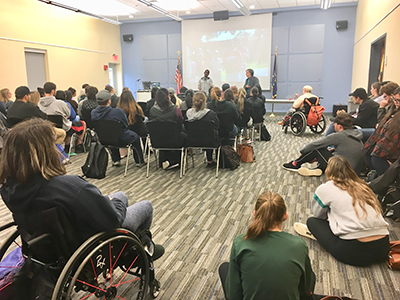Cynthia Eaton
“I don't understand,” she exclaimed indignantly. “Why don’t they just get rid of that guy, then!?” "That guy" referred to Robert Mugabe, who was then president of Zimbabwe. This student’s outburst took place during the November 7 presentation by Tinashe Basa and Dennis Gaboury of ZimKids Orphan Trust, a 501(c)(3) nonprofit educational center, during which students learned about the factors making Zimbabwe one of the poorest nations on Earth. But just one week before the military coup (that they denied was a coup) that began the ouster of Mugabe, who had held that post for 37 years, this Eastern Campus student was expressing a frustration that must have been felt by the 16+ million residents of Zimbabwe plus thousands of others across the globe.
|
||||||||||||||||||||||||
 |
|
Tinashe Basa and Dennis Gaboury, at front below screen, speak during their 12:30 pm presentation at the Eastern Campus. (photo by Cynthia Eaton) |
|
ZimKids helps over 300 orphans in Pumula North, one of the poorest neighborhoods of Bulawayo, Zimbabwe. The Zimkids educational center includes a preschool, computer lab, library, kitchen, clinic, sewing center, market garden with drip irrigation and sports fields with an obstacle course.
The youngest ZimKids are taught in preschool by teachers who were themselves beneficiaries of ZimKids and who now hold their teaching certificates. Elementary-aged ZimKids are taught by others older than themselves. Vocational training in welding, construction, carpentry and sewing—highly marketable skills in Zimbabwe—as well as other fields help prepare older orphans to seek gainful employment.
The center itself was built by the teenaged orphans, with Gaboury, a sculptor, providing on-the-job training for the team. This “let’s do this together” model is closely aligned with the model of an effective union.
Fundraising with “toys from trash”
The other grassroots element that makes ZimKids so compelling is the integration of the children’s own creations, their own handiwork, into the existence of the center.
Gaboury came up with the idea of ZimKids Orphan Trust after he was tagging along with his wife, Elinor Burkett, who was in Zimbabwe on a Fulbright. Visiting different areas of the city of Bulawayo, Gaboury was taken aback by how many children—living in one of the poorest nations on earth—would salvage bits of trash to create dolls and wire toys for themselves.
He had an idea to create a toy-making competition to raise money and was successful in conducting a citywide event for a couple years, then realized that was insufficient in making a sustainable difference in the children’s lives.
Everything changed when he met Tinashe Basa at a city library. Basa says that after he had seen children at the public library struggling to read, he talked to the director and began volunteering there as a tutor. This greatly displeased Basa's family who wanted him to pursue paid work to contribute to the family. But teaching children brought Basa so much joy.
Gaboury and Basa teamed up to start ZimKids Orphan Trust. They started working with children under a guava tree, then eventually achieved enough through fundraising to begin building the educational center they enjoy to this day.
Now the 300+ ZimKids children make additional wire toys and dolls for Gaboury and Basa to bring to the states as a gift to donors of $30 or more. Each doll or toy comes with a photo and brief biography of the creator, and donors are encouraged to take a selfie and write back to the toy’s creator (click the "show all" link in this album to view photos from the 2015 ZimKids visit). This, ideally, initiates a wonderful pen-pal relationship.
 |
||||
These Eastern Campus students shared some of their selfies with us after purchasing wire toys and dolls as a donation to ZimKids Orphan Trust. After receiving a photo and bio of the toymaker, donors are encouraged to email their selfie along with a note to the child who made that toy as a way to initiate a pen-pal relationship. |
||||
Skyping and singing with ZimKids
A perennial favorite aspect of the ZimKids presentations on campus is the opportunity to Skype with the schoolchildren in Zimbabwe. This has to be done very early in the morning, as that means it’s late afternoon in Zimbabwe and children will leave the center to go back to whichever relatives or guardians they stay with.
SCCC students enjoy conversing with the ZimKids and are pleased to discover that they have a lot in common, including a love of video games (for the older teens in the ZimKids crew), sports, food, music and, yes, even school.
Tinashe Basa and Dennis Gaboury facilitate an international conversation between the orphans in Zimbabwe and the students on the SCCC Eastern Campus. (photo by Cynthia Eaton) |
They also have an opportunity to think through cultural differences, such as how children in Zimbabwe sleep on bare concrete floors without so much as a pillow and how children are viewed as a labor source rather than encouraged to attend and excel at school.
They also learned that, unlike Americans, Zimbabweans venerate their elders, which helps explain why the millions suffering under Mugabe's presidency—citizens on average are now 15% poorer than when Mugabe came into power in 1980—tolerated the 93-year-old's presidency for so long.
But now, seeing that Mugabe is no longer president of Zimbabwe, we all feel a bit more hopeful about the lives of the joyous ZimKids. Visit ZimKids.com to see how you too can contribute to the health and well being of these deserving orphans and make their futures even brighter.
